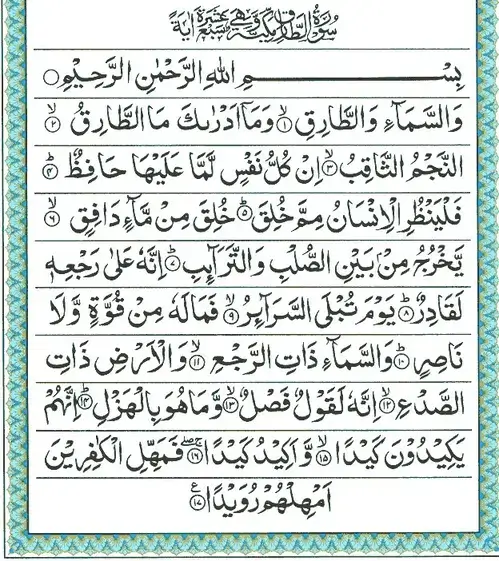The Qur’anic chapter called Surah At-Tariq contains 17 meaningful verses as its 86th portion. Surah At-Tariq exists in Surah 86 as a Meccan revelation whose title comes from “The Night Star” which symbolizes divine secrets and wonder. The chapter effectively portrays human origins along with judgmental responsibility until the moment of resurrection so believers can contemplate both life and Allah’s absolute power.
Famous scholars view Surah At-Tariq as presenting an essential message about where humans originate and where they will go back to Allah. The verses show that the Creator has the power to regenerate life by observing human birth and watching natural cycles. Theophanologists and researchers affirm that this Surah uses celestial imagery to illustrate Allah’s resurrection theme through its profound depiction of stars and rain that return to create new beginnings.
The Surah At-Tariq guides hearts to recognize Allah’s unsurpassed power coupled with absolute equity. Through its recitation believers strengthen their faith and become more aware of the coming judgment. The act of recitation also creates divine protection. Whoever considers this teaching develops appreciation, humbleness and requires trust in their Creator for the entirety of their existence.
Overview of Surah At-Tariq
- Chapter Name: At-Tariq
- Meaning: The Night Star
- Number of Verses: 17
- Location in Qur’an: 30th Para
- Classification: Meccan Surah
Surah At-Tariq urges believers to reflect on their origin, reminds them of the inevitability of resurrection, and highlights the Qur’an’s supreme value. It emphasizes Allah’s capability to create and recreate and stresses the accountability of every soul in the hereafter.
| Para / Chapter | 30 |
| Surah Name | At-Tariq |
| Classification | Meccan – Makki Surah |
| Surah No | 86 |
What Is Surah At- Tariq Translation and Transliteration in English & Urdu (Verse by Verse)?

بِسۡمِ ٱللَّهِ ٱلرَّحۡمَٰنِ ٱلرَّحِيمِ
Bismillah hir rahman nir raheem
In the name of Allah, the Entirely Merciful, the Especially Merciful.
1-وَٱلسَّمَآءِ وَٱلطَّارِقِ
Wassamaaa’i wattaariq
ترجمہ : آسمان اور رات کے وقت آنے والے کی قسم
By the heaven and the Morning Star
Tafseer:
The Surah starts with an oath towards the sky together with ‘Tariq’ as the piercing star creates wonder during nighttime. The star functions as a powerful divine symbol of awareness that guides divinely.
2-وَمَآ أَدۡرَىٰكَ مَا ٱلطَّارِقُ
Wa maaa adraaka mattaariq
ترجمہ : اور تم کو کیا معلوم کہ رات کے وقت آنے والا کیا ہے
Ah, what will tell thee what the Morning Star is!
Tafseer:
This verse invites contemplation. Undoubtedly, human intellect fails to grasp the glory of celestial phenomena. It hints that the recognition of Allah’s might is beyond comprehension.
3-ٱلنَّجۡمُ ٱلثَّاقِبُ
Annajmus saaqib
ترجمہ : وہ تارا ہے چمکنے والا
The piercing Star!
Tafseer:
Here, the term ‘star’ symbolizes light piercing through the dark vastness, much like divine guidance cutting through human ignorance. It also reflects the unshakable precision of Allah’s creation.
4-إِن كُلُّ نَفۡسٖ لَّمَّا عَلَيۡهَا حَافِظٞ
In kullu nafsil lammaa ‘alaihaa haafiz
ترجمہ : کہ کوئی متنفس نہیں جس پر نگہبان مقرر نہیں
No human soul but hath a guardian over it.
Tafseer:
This verse urges man to reflect on his lowly origin. Contemplation leads to humility, as it shows dependence on Allah. Realizing this should remove arrogance and bring forth gratitude.
5-فَلۡيَنظُرِ ٱلۡإِنسَٰنُ مِمَّ خُلِقَ
Fal yanzuril insaanu mimma khuliq
رجمہ : تو انسان کو دیکھنا چاہئے کہ وہ کاہے سے پیدا ہوا ہے
So let man consider from what he is created.
Tafseer:
This verse urges man to reflect on his lowly origin. Contemplation leads to humility, as it shows dependence on Allah. Realizing this should remove arrogance and bring forth gratitude.
6-خُلِقَ مِن مَّآءٖ دَافِقٖ
Khuliqa mim maaa’in daafiq
ترجمہ : وہ اچھلتے ہوئے پانی سے پیدا ہوا ہے
He is created from a gushing fluid
Tafseer:
The process of human creation, from a mere fluid, serves as a reminder of divine artistry and man’s fragile beginnings.
7-يَخۡرُجُ مِنۢ بَيۡنِ ٱلصُّلۡبِ وَٱلتَّرَآئِبِ
Yakhruju mim bainissulbi wat taraaa’ib
رجمہ : جو پیٹھ اور سینے کے بیچ میں سے نکلتا ہے
That issued from between the loins and ribs.
Tafseer:
This description emphasizes the biological intricacy in man’s creation. It illustrates the Creator’s power in developing life using the simplest and most minute starting points.
8-إِنَّهُۥ عَلَىٰ رَجۡعِهِۦ لَقَادِرٞ
Innahoo ‘alaa raj’ihee laqaadir
رجمہ : بےشک خدا اس کے اعادے (یعنی پھر پیدا کرنے) پر قادر ہے
Lo! He verily is Able to return him (unto life)
Tafseer:
This verse asserts resurrection. The One who created man initially is surely capable of reviving him after death. It solidifies belief in life after death.
9-يَوۡمَ تُبۡلَى ٱلسَّرَآئِرُ
Yawma tublas saraaa’ir
رجمہ : جس دن دلوں کے بھید جانچے جائیں گے
On the day when hidden thoughts shall be searched out.
Tafseer:
It describes the Day of Judgment as a time when hidden intentions, secrets, and actions will be openly unveiled. Humans must remain conscious of their deeds.
10-فَمَا لَهُۥ مِن قُوَّةٖ وَلَا نَاصِرٖ
Famaa lahoo min quwwatinw wa laa naasi
ترجمہ : تو انسان کی کچھ پیش نہ چل سکے گی اور نہ کوئی اس کا مددگار ہو گا
Then will he have no might nor any helper.
Tafseer:
On that day, no wealth, status, or ally will save a person. Only faith and righteous deeds will provide deliverance.
11-وَٱلسَّمَآءِ ذَاتِ ٱلرَّجۡعِ
Wassamaaa’i zaatir raj’
رجمہ : آسمان کی قسم جو مینہ برساتا ہے
By the heaven which giveth the returning rain,
Tafseer:
The sky is sworn upon as a witness. Its role in perpetuating the water cycle symbolizes renewal and Allah’s mercy.
12-وَٱلۡأَرۡضِ ذَاتِ ٱلصَّدۡعِ
Wal ardi zaatis sad.’
ترجمہ : اور زمین کی قسم جو پھٹ جاتی ہے
And the earth which splitteth (with the growth of trees and plants)
Tafseer:
The earth splitting to yield plants mirrors resurrection. Dead soils turn fertile through divine intervention, much like human revival.
13-إِنَّهُۥ لَقَوۡلٞ فَصۡلٞ
Innahoo laqawlun fasl
ترجمہ : کہ یہ کلام (حق کو باطل سے) جدا کرنے والا ہے
Lo! this (Qur’an) is a conclusive word,
Tafseer:
This verse declares the Qur’an as decisive and separates truth from falsehood.
14-وَمَا هُوَ بِٱلۡهَزۡلِ
Wa maa huwa bil hazl
ترجمہ : اور بیہودہ بات نہیں ہے
It is no pleasantry.
Tafseer:
The Qur’an is mentioned as a serious, purposeful revelation. It should be approached with reverence and action.
15-إِنَّهُمۡ يَكِيدُونَ كَيۡدٗا
Innahum yakeedoona kaidaa
ترجمہ : یہ لوگ تو اپنی تدبیروں میں لگ رہے ہیں
Lo! they plot a plot (against thee, O Muhammad)
Tafseer:
It addresses the disbelievers’ plots against the message of Islam. However, their efforts hold no power against the divine will.
16-وَأَكِيدُ كَيۡدٗا
Wa akeedu kaidaa
ترجمہ : اور ہم اپنی تدبیر کر رہے ہیں
And I plot a plot (against them).
Tafseer:
This asserts Allah’s control over all schemes. His plans surpass all human efforts, delivering justice and protection to the believers.
17-فَمَهِّلِ ٱلۡكَٰفِرِينَ أَمۡهِلۡهُمۡ رُوَيۡدَۢا
Famahhilil kaafireena amhilhum ruwaidaa
ترجمہ : تو تم کافروں کو مہلت دو بس چند روز ہی مہلت دو
So give a respite to the disbelievers. Deal thou gently with them for a while.
Tafseer:
The disbelievers are warned to enjoy their short-term worldly pleasures because their ultimate fate lies in Allah’s hands.
| Verse Number | Arabic Text | Translation (Urdu) | Translation (English) |
| 1 | وَٱلسَّمَآءِ وَٱلطَّارِقِ | آسمان اور رات کے وقت آنے والے کی قسم | By the heaven and the Morning Star |
| 2 | وَمَآ أَدۡرَىٰكَ مَا ٱلطَّارِقُ | اور تم کو کیا معلوم کہ رات کے وقت آنے والا کیا ہے | Ah, what will tell thee what the Morning Star is! |
| 3 | ٱلنَّجۡمُ ٱلثَّاقِبُ | وہ تارا ہے چمکنے والا | The piercing Star! |
| 4 | إِن كُلُّ نَفۡسٖ لَّمَّا عَلَيۡهَا حَافِظٞ | کہ کوئی متنفس نہیں جس پر نگہبان مقرر نہیں | No human soul but hath a guardian over it. |
| 5 | فَلۡيَنظُرِ ٱلۡإِنسَٰنُ مِمَّ خُلِقَ | تو انسان کو دیکھنا چاہئے کہ وہ کاہے سے پیدا ہوا ہے | So let man consider from what he is created. |
| 6 | خُلِقَ مِن مَّآءٖ دَافِقٖ | وہ اچھلتے ہوئے پانی سے پیدا ہوا ہے | He is created from a gushing fluid |
| 7 | يَخۡرُجُ مِنۢ بَيۡنِ ٱلصُّلۡبِ وَٱلتَّرَآئِبِ | جو پیٹھ اور سینے کے بیچ میں سے نکلتا ہے | That issued from between the loins and ribs. |
| 8 | إِنَّهُۥ عَلَىٰ رَجۡعِهِۦ لَقَادِرٞ | بےشک خدا اس کے اعادے (یعنی پھر پیدا کرنے) پر قادر ہے | Lo! He verily is Able to return him (unto life) |
| 9 | يَوۡمَ تُبۡلَى ٱلسَّرَآئِرُ | جس دن دلوں کے بھید جانچے جائیں گے | On the day when hidden thoughts shall be searched out. |
| 10 | فَمَا لَهُۥ مِن قُوَّةٖ وَلَا نَاصِرٖ | تو انسان کی کچھ پیش نہ چل سکے گی اور نہ کوئی اس کا مددگار ہو گا | Then will he have no might nor any helper. |
| 11 | وَٱلسَّمَآءِ ذَاتِ ٱلرَّجۡعِ | آسمان کی قسم جو مینہ برساتا ہے | By the heaven which giveth the returning rain, |
| 12 | وَٱلۡأَرۡضِ ذَاتِ ٱلصَّدۡعِ | اور زمین کی قسم جو پھٹ جاتی ہے | And the earth which splitteth (with the growth of trees and plants) |
| 13 | إِنَّهُۥ لَقَوۡلٞ فَصۡلٞ | کہ یہ کلام (حق کو باطل سے) جدا کرنے والا ہے | Lo! this (Qur’an) is a conclusive word, |
| 14 | وَمَا هُوَ بِٱلۡهَزۡلِ | اور بیہودہ بات نہیں ہے | It is no pleasantry. |
| 15 | إِنَّهُمۡ يَكِيدُونَ كَيۡدٗا | یہ لوگ تو اپنی تدبیروں میں لگ رہے ہیں | Lo! they plot a plot (against thee, O Muhammad) |
| 16 | وَأَكِيدُ كَيۡدٗا | اور ہم اپنی تدبیر کر رہے ہیں | And I plot a plot (against them). |
| 17 | فَمَهِّلِ ٱلۡكَٰفِرِينَ أَمۡهِلۡهُمۡ رُوَيۡدَۢا | تو تم کافروں کو مہلت دو بس چند روز ہی مہلت دو | So give a respite to the disbelievers. Deal thou gently with them for a while. |
Benefits of Reciting Surah At-Tariq
Divine Protection:
The verses establish the presence of a guardian over every soul. Reciting it strengthens faith in Allah’s protection.
Reward for Recitation:
It is said, in several narrations, that reciting this Surah yields rewards as numerous as the stars in the sky.
Elevated Status in the Hereafter:
According to Islamic narrations, consistent recitation ensures a high position with Allah and companionship with the Prophets in Paradise.
Healing and Wazifa:
Surah At-Tariq serves as a remedy for physical and emotional ailments. Specific verses are used in powerful wazaif for menstrual disorders, safety from harm, and safeguarding one’s home from danger.
Reflection on Creation:
It inspires deep thought on the origin of life and the Creator’s undeniable power.
Best Times to Recite Surah At-Tariq
- Before Fajr Salah to begin your day with reflection and spiritual enlightenment.
- During Tahajjud prayer for seeking forgiveness and closeness to Allah.
- On Fridays for immense rewards and barakah in life.
- When seeking solutions to problems or strengthening faith in the Day of Resurrection.
Wazifa Using Surah At-Tariq
Wazifa for Healing Menstrual Disorders
- Perform fresh ablution (Wudu).
- Recite Durood-e-Pak 11 times.
- Read verses 4-7 of Surah At-Tariq 31 times.
- Recite Durood-e-Pak again 11 times.
- Blow over water and drink.
Regular practice until recovery executes with both clear intentions and constant faith in Allah should continue.
Reflection
Surah At-Tariq presents enlightened teachings about human creation and resurrection together with their subsequent judgment before Allah. Believers strengthen their faith in Allah’s power through its motivational effect which helps them prepare for the Day of Judgment. You obtain tranquility together with heavenly blessings as well as understanding that your life has to follow Qur’anic teachings when you recite this prayer.

